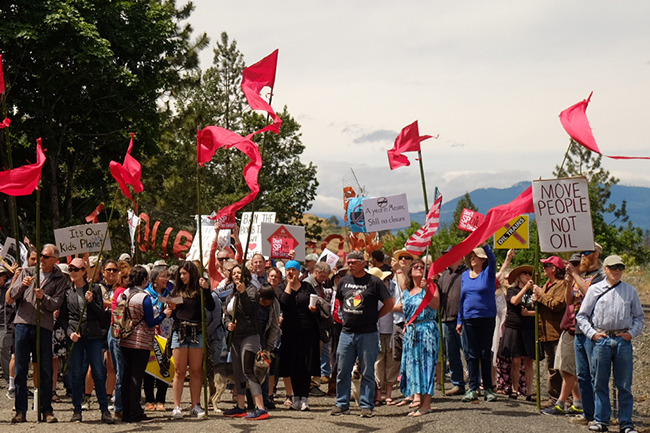by Patrick Mulvihill
The Dalles Chronicle (original story)
One year after an oil train derailment roiled communities throughout the Columbia Gorge, hundreds gathered at Mosier Community School to remember the fiery wreck and speak out against proposed fossil fuel terminal developments.
Voices of activists occasionally competed with trains rumbling on the Union Pacific Railroad tracks, across Highway 30 from the school lawn.
On June 3, 2016, the scene had been one of fear and disaster response when a train carrying Bakken crude oil left the tracks and caught fire. The school served as an emergency response command center. Students were bussed out of town and hundreds of residents were evacuated before crews extinguished the blaze, which left no injuries.
On Saturday, the mood alternated from reflective to energized. Environmental, health and faith groups, as well as representatives from Northwest tribes, spoke. More than 250 people attended the demonstration, which was organized by the Stand Up To Oil coalition.
Carina Miller, a Tribal Council member of the Confederation Tribes of Warm Springs, said, “These kinds of incidents are opportunities for us to feel the pain and the reality of what we have allowed this government to become, which is big money.
“It has meant a great deal to me to have people come into my life who I know genuinely care about tribal issues, not because it can make more people money … but because they understand what our tribes have been resilient through.”
JoDe Goudy, Yakama Nation Tribal Council Chairman, described the history of treaty tribes’ treatment by the United States government, and highlighted recent gatherings against fossil fuel development like Standing Rock in North Dakota.
“Residents of the city of Mosier, you were the materialized collateral damage of an advocacy for profit margins. How does that make you feel? Does that make you feel like you’re dehumanized?” Goudy said.
Hood River Mayor Paul Blackburn said, “I’m terrified for the Gorge, which has become a through-way for these fuel trains coming through.” He urged citizens to “not demonize the other guy” and work with people of differing ideologies to affect change.
Other speakers that day included Jacob Vallie, a former Mosier School student, Dr. Maria McCormick, a Mosier physician, Acasia Berry of Mosier, and Rev. John Boonstra with Columbia Gorge Action Network.
Two elected officials from city councils in Washington decried planned fossil fuel hubs in that state: Alishia Topper from Vancouver and Ryan Mello from Tacoma.
A procession took marchers to the derailment site, below and west of the Rock Creek overpass. They waved signs, some of which read, “Don’t SpOIL the Gorge” and “No Oil Trains.” The event culminated with a final march to the Columbia River by the Rock Creek trestle.

